The music of Haiti combines a wide range of influences drawn from the many people who have settled on this Caribbean island. It reflects French, African rhythms, Spanish elements and others who have inhabited the island of Hispaniola and minor native Taino influences. Styles of music unique to the nation of Haiti include music derived from rara parading music, twoubadou ballads, mini-jazz rock bands, rasin movement, hip hop Creòle, the wildly popular compas, and méringue as its basic rhythm. Haitian music is influenced mostly by European colonial ties and African migration. In the case of European colonization, musical influence has derived primarily from the French.
The Tonton Macoute or simply the Macoute was a Haitian paramilitary and secret police force created in 1959 by dictator François "Papa Doc" Duvalier. Haitians named this force after the Haitian mythological bogeyman, Tonton Macoute, who kidnaps and punishes unruly children by snaring them in a gunny sack before carrying them off to be consumed for breakfast. The Macoute were known for their brutality, state terrorism, and assassinations. In 1970, the militia was renamed the Volontaires de la Sécurité Nationale. Though formally disbanded in 1986, its members continued to terrorize the country.
The culture of Haiti is a creolized blend of African, European and Taino elements due to the French colonization of Amerindian land, in conjunction with the large diverse enslaved African population whom had later freed themselves by a successful revolt. These attributions have largely influenced the art, cuisine, literature, music, religion as well as the languages of Haiti.

Boukman Eksperyans is a mizik rasin band from the city of Port-au-Prince, Haiti, Grammy nominated for their debut album Vodou Adjae. The band derives its name from Dutty Boukman, a vodou priest who led a religious ceremony in 1791 that is widely considered the start of the Haitian Revolution. The other half of the band's name, "Eksperyans", is the Haitian Creole word for "experience", and was inspired by the band's appreciation of the music of Jimi Hendrix. The band was at the height of its popularity in 1991 when the presidency of Jean Bertrand Aristide was overthrown in a military coup d'etat. Like many other artists and performers, Boukman Eksperyans fled the country to live in exile. During their time abroad, the band performed and spoke out against the military dictatorship of Raoul Cédras. In 1994, after Aristide was restored to power, the band returned to Haiti, where they continued to play concerts, record albums, and perform at the Carnival celebrations.
Bois Caïman was the site of the first major meeting of enslaved blacks during which the first major slave insurrection of the Haitian Revolution was planned.
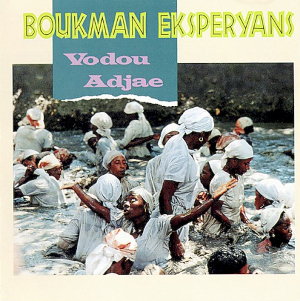
Vodou Adjae is the first album of the Haitian music group Boukman Eksperyans. It is distributed in the United States and Canada by Mango, a division of Island Records. All of the songs are in Haitian Creole.
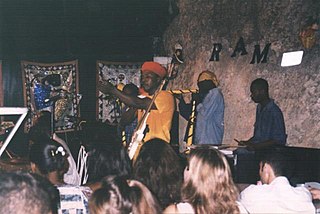
RAM is a mizik rasin band based in the city of Port-au-Prince, Haiti. The band derives its name from the initials of its founder, songwriter, and lead male vocalist, Richard A. Morse. The band's music has been described by Morse as "Vodou rock 'n' roots", and has been one of the prominent bands in the mizik rasin musical movement in Haiti. RAM began performing together in 1990, and recorded their first album in 1996. The band's music incorporates traditional Vodou lyrics and instruments, such as rara horns and petro drums, into modern rock and roll. The band's songs include lyrics in Haitian Creole, French, and English.
Toto Bissainthe was a Haitian actress and singer known for her innovative blend of traditional Vodou and rural themes and music with contemporary lyricism and arrangements. Born in Cap-Haïtien in 1934, she left Haiti at an early age to pursue her acting studies abroad. Her career started in theatre with the company Les Griots, of which she was a founding member in 1956. Les Griots was at the vanguard of négritude-inspired cultural institutions in France, and was the first African theatre company in Paris and the first to perform of Jean Genet's play "Les Nègres". She also worked with playwright Samuel Beckett, played a co-starring role in Raoul Peck's "L'homme sur les quais", and worked with other directors such as Roger Blin, and performed in several films.
"Fèy" is a traditional Vodou folk song in Haiti. In Haitian Creole, "fèy" means "leaf", and the lyrics of the song describe a leaf falling from a tree. Like many traditional songs in Vodou folklore, the lyrics of "Fèy" can hold many meanings, both religious and political. At least two mizik rasin bands in the 1990s sang adaptations of the traditional song. A version first performed by RAM in 1992 was banned throughout Haiti during the remaining years of the Raoul Cédras military junta.
Richard Auguste Morse is a Puerto-Rican-born Haitian-American musician and hotel manager currently residing in Port-au-Prince, Haiti. Morse manages the Hotel Oloffson, and is the founder of a mizik rasin band, RAM, named after his initials. Morse is married to the band's lead female vocalist, Lunise Morse, and has two children. Morse and his band are famous in Haiti for their political songs and performances critical of the Raoul Cédras military junta from 1991 to 1994. In the early 2000s, Morse has also criticized Jean-Bertrand Aristide and Fanmi Lavalas through his music. Morse is a United States citizen. His cousin Michel Martelly is a musician, right-wing Haitian politician and former President of Haiti. Richard Morse repeatedly expressed support for Martelly in the 2010 presidential elections in Haiti. By the end of 2012, he had distanced himself from the Martelly government.
John Steve Brunache is a famous Haitian musician who came to prominence during the 80's and 90's. He is an influential figure who spoke on the issues of the times with such songs as "La Relev", "Chimen Limye", and "timoun yo".
Haitian Carnival is a celebration held over several weeks each year leading up to Mardi Gras. Haitian Defile Kanaval is the Haitian Creole name of the main annual Mardi Gras carnival held in Port-au-Prince, Haiti.

Frisner Augustin was a major performer and composer of Haitian Vodou drumming, and the first and only citizen of Haiti to win a National Heritage Fellowship from the National Endowment for the Arts in the United States, where he resided for forty years.
Twoubadou music is a popular genre of guitar-based music from Haiti that has a long and important place in Haitian culture. The word comes from troubadour, a medieval poet-musician who wrote and sang songs about courtly love. Like the troubadours of old, the Haitian twoubadou is a singer-composer who accompanies himself on songs that tell about the bitterness and humor of love, often using risqué or suggestive lyrics.
Haitian rock, or rock kreyòl, started as rock n roll in Haiti in the early 1960s. It was played by rock bands called yeye bands. The name yeye derives from the Beatles lyrical verse, "yeah, yeah, yeah", which took off in the United States and was listened to by upper class Haitian families who had access to the radio. Young Haitians formed small electric guitar-based bands. These yeye rock bands were short-lived, as the addition of compas to their repertoires resulted in a sound was called mini-jazz, or mini-djaz in Haitian Creole.
Eddy François is a Haitian musician,
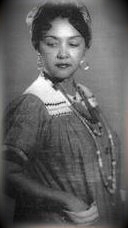
Lina Mathon-Blanchet was a Haitian pianist, music teacher and composer. First director of the Conservatoire National, she was interested in Haiti's folkloric traditions and was one of the first performers to include Vodou-influenced theatrical performances on the public stage in the country. Founding several folkloric troupes, she led her artists on tours throughout the United States and was noted as a teacher and mentor to many prominent Haitian performers. Trained in classical music traditions she collected traditional songs documenting the lyrics, melodies, and rhythms found as traditional themes in Haitian music. She is widely recognized as one of the most influential figures in the development of music in Haiti in the twentieth-century.
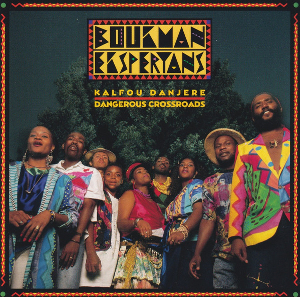
Kalfou Danjere is an album by the Haitian band Boukman Eksperyans, released in 1992. The title track, which translates to "Dangerous Crossroads", was banned in Haiti for its alleged subversive qualities. "Nwel Inosan" was also banned.
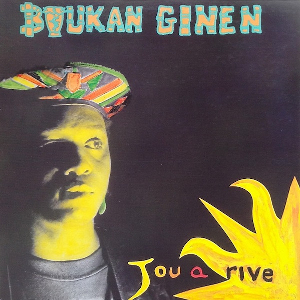
Jou a Rive is the debut album by the Haitian band Boukan Ginen, released in 1995. It was originally released in Haiti in 1993. Most of the lyrics were sung in Creole.






